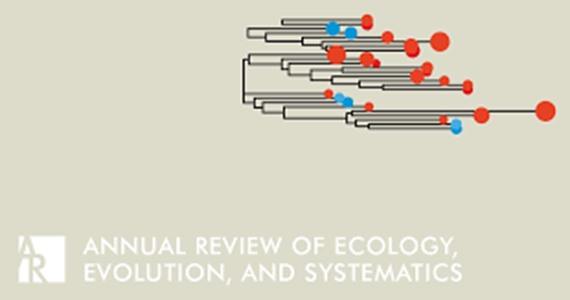A Dual Role for Behavior in Evolution and Shaping Organismal Selective Environments
IF 11.2
1区 生物学
Q1 ECOLOGY
Annual Review of Ecology, Evolution, and Systematics
Pub Date : 2021-11-02
DOI:10.1146/annurev-ecolsys-012921-052523
引用次数: 3
Abstract
The hypothesis that evolved behaviors play a determining role in facilitating and impeding the evolution of other traits has been discussed for more than 100 years with little consensus beyond an agreement that the ideas are theoretically plausible in accord with the Modern Synthesis. Many recent reviews of the genomic, epigenetic, and developmental mechanisms underpinning major behavioral transitions show how facultative expression of novel behaviors can lead to the evolution of obligate behaviors and structures that enhance behavioral function. Phylogenetic and genomic studies indicate that behavioral traits are generally evolutionarily more labile than other traits and that they help shape selective environments on the latter traits. Adaptive decision-making to encounter resources and avoid stress sources requires specific sensory inputs, which behaviorally shape selective environments by determining those features of the external world that are biologically relevant. These recent findings support the hypothesis of a dual role for behavior in evolution and are consistent with current evolutionary theory.行为在进化和形成生物选择环境中的双重作用
进化的行为在促进和阻碍其他特征的进化中起决定性作用的假设已经讨论了100多年,除了同意这些观点在理论上是合理的,与现代综合理论一致之外,几乎没有达成共识。最近许多关于支持主要行为转变的基因组、表观遗传学和发育机制的综述表明,新行为的兼性表达如何导致增强行为功能的专性行为和结构的进化。系统发育和基因组研究表明,行为特征在进化上通常比其他特征更不稳定,它们有助于形成后一种特征的选择环境。应对资源和避免压力源的适应性决策需要特定的感官输入,这些感官输入通过确定与生物相关的外部世界的那些特征,在行为上塑造了选择性环境。这些最近的发现支持了行为在进化中扮演双重角色的假设,并与当前的进化理论相一致。
本文章由计算机程序翻译,如有差异,请以英文原文为准。
求助全文
约1分钟内获得全文
求助全文
来源期刊
CiteScore
19.90
自引率
1.70%
发文量
21
期刊介绍:
The Annual Review of Ecology, Evolution, and Systematics is a scholarly publication that has been in circulation since 1970. It focuses on important advancements in the areas of ecology, evolutionary biology, and systematics, with relevance to all forms of life on Earth. The journal features essay reviews that encompass various topics such as phylogeny, speciation, molecular evolution, behavior, evolutionary physiology, population dynamics, ecosystem processes, and applications in invasion biology, conservation, and environmental management. Recently, the current volume of the journal transitioned from a subscription-based model to open access through the Annual Reviews' Subscribe to Open program. Consequently, all articles published in the current volume are now available under a CC BY license.

 求助内容:
求助内容: 应助结果提醒方式:
应助结果提醒方式:


